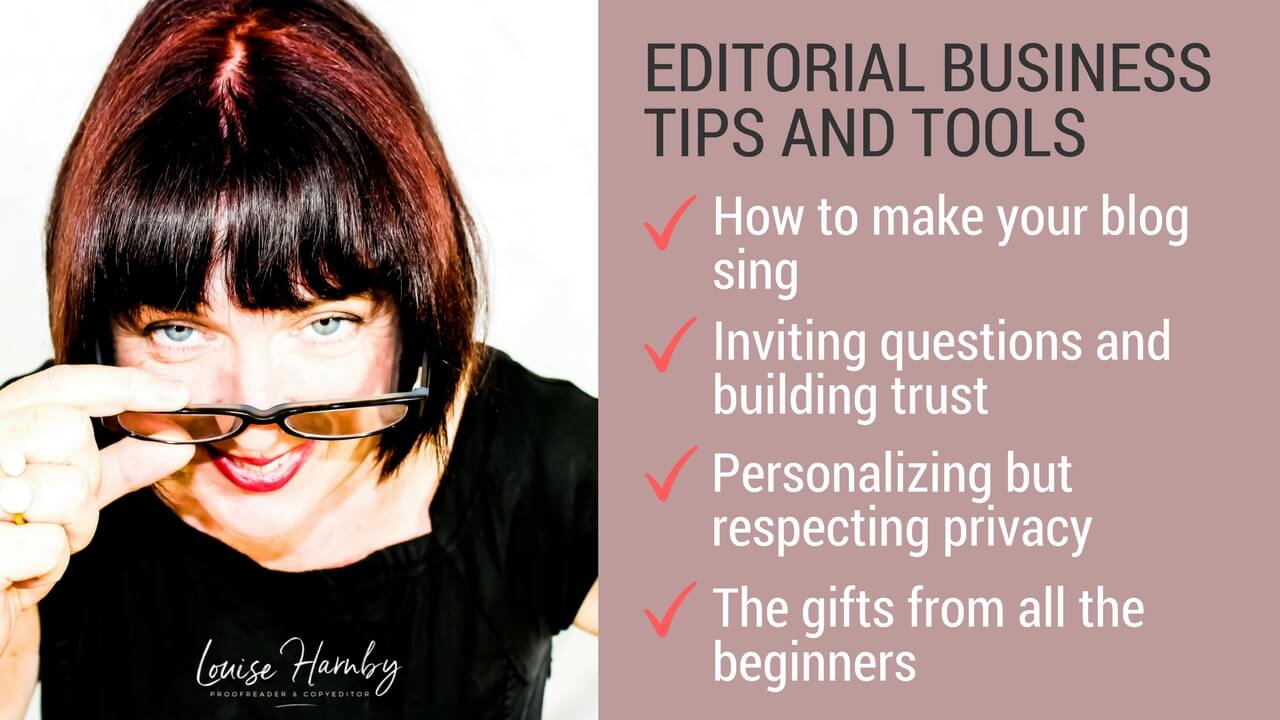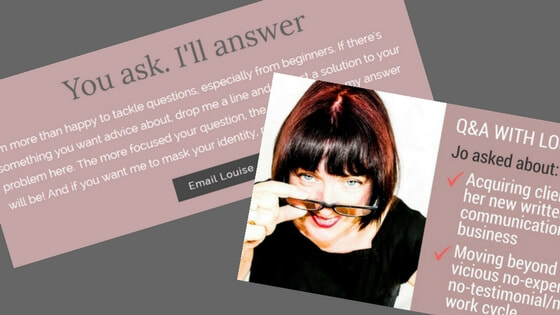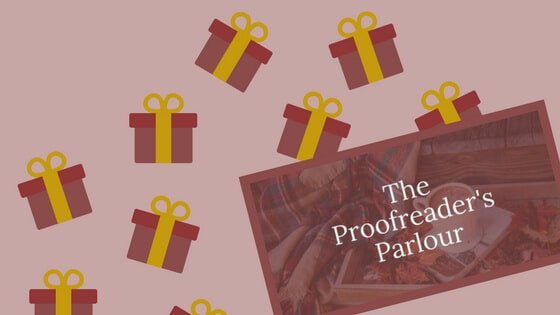|
One of the main reasons why blogs (and vlogs or podcasts) die is because the creator finds it difficult to maintain the momentum. ‘What am I going to write about?’ ‘What if it’s already been covered elsewhere?’
Invite questions … Inviting people to email me with questions is my top tip for generating blog ideas that are right on target. Questions are how your readers frame their problems. And when you solve those problems, you help people – make life easier for them. And that’s one of the most powerful ways of engaging with someone … just like in real life. All you need for one blog post is one question from one person. That’s because even though only one person has asked, there’s a good chance that many more people have wondered the same thing. Solve that one person’s problem and you’ve probably solved a hundred people’s problems.
Customize and personalize
My Q&A series is built on precisely this premise. When someone emails me with a question, I tell them that I’ll write a detailed answer for them on the blog. The answer won’t be generic, but specifically for them. My articles are often quite broad-based – they aim to talk to lots of people at once: how to create a resource hub, which proofreading courses I recommend, grammar rules and preferences, online writing courses, how to price proofreading and copyediting projects, and so on. But there’s nothing generic about how I handled Rachel’s question: ‘I have multiple sclerosis and severely reduced manual dexterity – can I become a professional proofreader?’ The blog post I created in response to that was written just for her. And, yet, two people emailed me after I published that post to thank me for it because they, too, had conditions that affected their fine motor skills and wanted some guidance on how that might impact on their ability to build a freelance editorial business. So that’s one question, and three people’s problems solved that I know of. I reckon there are plenty of other people out there who didn’t contact me, and never will, but who might have the exact same question. I make sure I stamp each Q&A blog post with a banner that identifies it clearly as part of this series. And at the end, I always include an invitation to get in touch.
Respect privacy
I think it’s a good idea to offer to mask a person’s identity. Some readers feel uncomfortable about asking questions in public. The reasons are varied but include worries about being judged or appearing to lack knowledge and experience. The reality is that none of us knows everything. We’re all learning … and always learning. I have plenty of answers up my sleeve, but I have a ton of questions, too. Sometimes I’m happy to ask them in public; other times I choose a more intimate space. At all times, trust is essential, so if you offer a Q&A-style service on your blog, take care to ensure that all parties are on the same page about what personal information will be included before you go live. I now have a dedicated form that Q&A participants fill in. This includes a section where the questioner can tell me whether they’re happy for me to use their first name, or if they want this and other identification markers masked. The gifts from all the beginners Don’t be afraid to tackle issues that you think are ‘easy’ or ‘simple’ or ‘basic’. Anything’s easy when you know the answer; when you don’t, the solution seems unreachable. Here’s a story from my own backyard ... I’ve been adding video into my marketing mix – shorties that introduce blog posts and resources I’ve created for self-publishing authors. I posted one of those videos into a marketing forum to get some feedback. My pal Mark Orr, an expert in smartphone video creation (Pocket Video School), told me that the resolution and head-positioning were off. There are, it turns out, fixes to both these problems, but they’re only straightforward when you know them. I didn’t, and it wasn’t until Mark and I had a proper chat on Skype that we worked out where I’d been going wrong. Something we discovered during that conversation is that there were about 20 more questions that I didn’t know the answer to but which were a doddle for him. He helped with all of them, but he told me I’d helped him, too, because I’d given him a few ideas of what to vlog about. He made me feel that my lack of knowledge was both welcome and an opportunity. And because he helped me, I now trust him. More on that later … Here’s an example of when the beginner question isn’t welcomed. In May 2017, Steven Pressfield posted about ‘Clueless Asks’, in which he states that when beginners ask ‘clueless’ questions, ‘they have not done their due diligence. Don’t ask a writer how to get an agent. Find out yourself. There are ten thousand sources online and a hundred books in the Writing section of a book store.’ Now, Pressfield has a point. There are no doubt thousands of online resources that will answer the question, and if you’re not interested in building an online platform that gets heard over the cacophony that is the internet, then you’ll sympathize with him. But – and it’s a huge but – if your blog is foundational to your visibility and you see it as a valuable tool for communicating and sharing with your colleagues and clients, then a ‘clueless ask’ is NOT a frustration. It’s a gift – and a precious one at that. It’s precious because it helps me publish articles that I know at least one person wants to read, articles that will help someone, and make their life easier.
The privilege of being asked and trusted
Every time someone asks me something that I think is easy, or obvious, or simple, or has already been answered elsewhere, I am reminded that my questioner asked me. Which means they came to my website, took the time to engage with me, chose to trust me (just like I came to trust Mark). That’s amazing, especially since we’re usually strangers to each other. And since they’ve privileged me with a visit, I’d like them to stay rather than nipping off somewhere else … and talking to someone whom they deem more helpful than me. A good blog is a helpful blog. And even if the content I post has been answered by someone else, somewhere else, the questioner couldn’t find it or didn’t go looking for it. They asked me. That means it’s worth having on my blog. And if they ask you, it’s worth having on your platform, too. Plus, each of us will answer in our own unique ways – with our own voices and experiences. Each of our approaches might differ a little or a lot. Either way, the internet is big enough for a multitude of voices and approaches. All of us can be part of the conversation, so my advice is to see the question (however basic) as a giant opportunity. Being audience-focused In ‘How to build a web presence that outsmarts, outperforms and outlasts the search engines’, Stoney deGeyter discusses how back in 1998 it was relatively easy to get the attention of the search engines. Good Google rankings could be found with the right keywords and links. These days, that’s not enough. Now, it’s about ‘creating a web presence that people love’. That means gearing it towards the audience, not the search engines. What better way to gear a blog towards an audience than answering the questions your audience has? Other ways to find the questions Inviting questions is one way of working out what problems need solving. But there are others, too. The key is to be clear about whom your intended audience is and where they’re hanging out. Once you know that, lurk and listen. Who’s asking what? Some options to consider include:
I hope this has given you some ideas about how to generate blog content that’s of genuine use to your readers. Inviting questions isn’t the only way, but it’s one I love because it personalizes my blog space and puts me in direct conversation with my readers. And in the spirit of the subject, don’t forget … You ask. I'll answer
I'm more than happy to tackle questions, especially from beginners. If there's something you want advice about, drop me a line and I'll post a solution to your problem here. The more focused your question, the more in-depth my answer will be! And if you want me to mask your identity, no problem.
Louise Harnby is a fiction copyeditor and proofreader. She curates The Proofreader's Parlour and is the author of several books on business planning and marketing for editors and proofreaders.
Visit her business website at Louise Harnby | Proofreader & Copyeditor, say hello on Twitter at @LouiseHarnby, or connect via Facebook and LinkedIn. If you're an author, you might like to join Louise’s Writing Library. Members receive monthly updates featuring self-publishing news and resources.
0 Comments
Your comment will be posted after it is approved.
Leave a Reply. |
BLOG ALERTSIf you'd like me to email you when a new blog post is available, sign up for blog alerts!
TESTIMONIALSDare Rogers'Louise uses her expertise to hone a story until it's razor sharp, while still allowing the author’s voice to remain dominant.'Jeff Carson'I wholeheartedly recommend her services ... Just don’t hire her when I need her.'J B Turner'Sincere thanks for a beautiful and elegant piece of work. First class.'Ayshe Gemedzhy'What makes her stand out and shine is her ability to immerse herself in your story.'Salt Publishing'A million thanks – your mark-up is perfect, as always.'CATEGORIES
All
ARCHIVES
July 2024
|
|
|
|



















 RSS Feed
RSS Feed





